Cortisol and Gut Health: How Probiotics May Help
Introduction
When you’re under stress, you feel it in your mind — but your gut feels it first. That fluttering in your stomach, the cramps before a big event, or the sluggish digestion during burnout aren’t coincidences. They’re signals from the gut-brain axis, the intimate communication line between your digestive system and your stress hormones — especially cortisol.
Cortisol is designed to help you survive danger. But in today’s world of chronic tension, this hormone can quietly disrupt the microbiome — the ecosystem of trillions of bacteria that live in your digestive tract. Over time, that imbalance contributes to fatigue, anxiety, inflammation, and even weight gain.
Emerging science shows that restoring gut balance with probiotics — beneficial bacteria — can help calm the stress response, regulate cortisol, and rebuild emotional and physical resilience.
Let’s explore how the gut and cortisol influence each other — and how probiotics can help restore harmony between your brain, body, and emotions. 🌸
Looking for supplements for This? Click here.
🌞 The Gut–Brain Axis: A Two-Way Conversation
Your gut isn’t just for digestion — it’s a sensory organ that communicates directly with your brain through nerves, hormones, and immune signals. This network is called the gut–brain axis.
The key messenger in this system is the vagus nerve, a communication highway that sends constant updates from the gut to the brain and back again.
When you’re relaxed, this pathway operates smoothly, promoting digestion, calmness, and immune balance. But under chronic stress, cortisol floods your system and alters how your gut functions:
It slows digestion and reduces nutrient absorption.
It weakens the intestinal barrier (“leaky gut”).
It changes the diversity of your gut microbiome.
In turn, an imbalanced gut sends distress signals back to the brain, perpetuating more cortisol release. It becomes a feedback loop of stress → gut imbalance → more stress.
That’s why gut health and cortisol regulation must be addressed together — not separately. 🌿
🌿 How Cortisol Affects Gut Function
When cortisol levels rise, several changes happen in your digestive system:
Reduced Blood Flow and Digestion
During stress, your body diverts blood away from the gut to your muscles and heart — preparing you to “fight or flee.” This slows digestion, leading to bloating, discomfort, and irregular bowel movements.
Increased Gut Permeability (“Leaky Gut”)
Cortisol weakens the tight junctions between intestinal cells, allowing toxins, undigested food particles, and bacteria to escape into the bloodstream. This triggers inflammation and immune overreaction.
Microbiome Imbalance (Dysbiosis)
Prolonged stress decreases beneficial bacteria like Lactobacillus and Bifidobacterium while encouraging opportunistic species that thrive in inflammation. This dysbiosis amplifies anxiety, fatigue, and metabolic issues.
Impaired Serotonin Production
Around 90% of serotonin — the “feel-good” neurotransmitter — is made in the gut. Cortisol disrupts this process, which contributes to low mood, sleep problems, and cravings.
These disruptions explain why so many people with chronic stress experience digestive discomfort and emotional instability at the same time. 🌸
🌸 How Gut Health Influences Cortisol

The gut doesn’t just receive messages from the brain — it sends them.
Your microbiome actively regulates how much cortisol you produce through multiple pathways:
Modulating the HPA Axis
Gut bacteria produce short-chain fatty acids (SCFAs) like butyrate that reduce inflammation and calm the HPA (hypothalamic-pituitary-adrenal) axis. When the microbiome is balanced, the stress response becomes more flexible and less reactive.
Producing Neuroactive Compounds
Certain gut bacteria synthesize GABA, serotonin, and dopamine — neurotransmitters that directly influence cortisol release and stress perception.
Supporting the Vagus Nerve
A healthy microbiome enhances vagus nerve tone, which signals the brain that it’s safe to relax. This lowers cortisol naturally and promotes a sense of calm.
In short, a healthy gut is like a natural cortisol thermostat — keeping your stress hormones from overheating. 🌿
🌿 The Role of Probiotics
Probiotics are live microorganisms that confer health benefits when consumed in adequate amounts. They restore microbial balance, enhance digestion, and strengthen gut barrier function — but their influence goes far beyond the stomach.
Recent research shows probiotics can help lower cortisol levels, improve mood, and reduce inflammation. They act as biochemical diplomats, restoring peace between your gut and your brain. 🌸
🌞 Probiotics That Help Regulate Cortisol
Different probiotic strains have different functions. Here are the most studied ones for cortisol regulation and stress relief:
Lactobacillus rhamnosus (JB-1)
This strain is famous for its ability to reduce anxiety-like behavior and modulate GABA receptors in the brain. Studies show it can lower blood cortisol and support emotional balance.
Bifidobacterium longum (1714)
Shown to improve focus and reduce cortisol spikes during stress. In clinical trials, subjects reported feeling calmer and more alert after supplementing this strain.
Lactobacillus helveticus + Bifidobacterium longum (Rosell-52 & Rosell-175)
This probiotic duo is one of the most studied combinations for stress management. Research shows it reduces psychological stress and lowers salivary cortisol.
Lactobacillus plantarum
Supports the gut barrier, reduces inflammation, and may improve serotonin balance. It’s helpful for people whose stress manifests as digestive upset.
Bacillus coagulans
A resilient spore-forming probiotic that supports immune balance and reduces cortisol-linked fatigue.
These strains, when taken regularly, can gradually retrain your body’s stress response — shifting it from overreaction to resilience. 🌿
🌸 Probiotics and Mood: The “Psychobiotic” Revolution
The term psychobiotic refers to probiotics that specifically benefit mental health by acting on the gut-brain axis.
These bacteria can:
Reduce anxiety and depressive symptoms
Improve sleep quality
Lower perceived stress
Reduce cortisol awakening response
In essence, psychobiotics don’t just restore gut flora — they restore emotional stability. 🌿
🌿 How Probiotics Improve Immune Balance
Cortisol and immunity are deeply intertwined. Chronic stress weakens your defenses, making you more susceptible to illness, allergies, and inflammation.
Probiotics counteract this by:
Enhancing mucosal immunity (your first defense barrier in the gut)
Regulating inflammatory cytokines
Strengthening the gut wall, preventing unwanted immune activation
When the immune system no longer has to fight constant “false alarms” from the gut, cortisol demand decreases — creating a virtuous cycle of calm and resilience. 🌞
🌞 Cortisol, Gut Inflammation, and Autoimmunity
Prolonged gut inflammation driven by cortisol and dysbiosis can set the stage for autoimmune conditions like multiple sclerosis, rheumatoid arthritis, and IBS.
Probiotics help break this cycle by restoring intestinal barrier integrity and modulating immune cells.
They help the immune system distinguish between real threats and harmless stimuli — one of the key hallmarks of immune health. 🌿
🌸 Combining Probiotics with Prebiotics
Prebiotics are non-digestible fibers that feed your beneficial bacteria.
When paired with probiotics, they form synbiotics, creating a synergistic effect.
Foods like chicory root, garlic, onions, asparagus, and green bananas are natural prebiotics that nourish your gut flora.
A probiotic without prebiotic support is like planting seeds without watering them — they need nourishment to thrive. 🌿
🌿 Other Nutrients That Support Cortisol and Gut Balance
Magnesium
Calms the nervous system and reduces cortisol release.
Omega-3 Fatty Acids
Support intestinal integrity and reduce inflammation.
Vitamin D
Improves gut barrier and immune tolerance while lowering cortisol.
B-Vitamins (especially B6 and B12)
Support neurotransmitter synthesis and adrenal resilience.
Together with probiotics, these nutrients create a foundation for gut–brain harmony. 🌸
Looking for supplements for This? Click here.
🌞 Lifestyle Habits That Reinforce Gut and Cortisol Health
Supplements are powerful, but your daily habits determine lasting results.
Eat mindfully. Slow, relaxed eating improves digestion and signals safety to the brain.
Sleep deeply. Lack of sleep increases gut permeability and cortisol.
Move moderately. Gentle exercise boosts microbiome diversity and lowers stress hormones.
Limit alcohol and sugar. Both damage gut flora and raise inflammation.
Practice breathwork or meditation. These lower cortisol and strengthen vagal tone. 🌿
Want to try Breathwork? Click Here.
🌿 The Cortisol–Microbiome Feedback Loop

Here’s how the cycle typically unfolds — and how probiotics interrupt it:
Chronic stress → elevated cortisol → weakened gut barrier.
Leaky gut → immune activation → inflammation → further HPA activation.
Inflammation → mood changes, fatigue, digestive symptoms.
Probiotics → rebuild gut lining, lower inflammation, restore feedback sensitivity.
Result: Balanced cortisol, calmer mind, stronger immunity. 🌞
🌸 Signs Your Gut Needs Probiotic Support
Bloating or irregular bowel movements
Fatigue and brain fog
Sugar or carb cravings
Frequent stress or anxiety
Food sensitivities
Poor sleep
Frequent colds or skin flare-ups
If several of these sound familiar, it’s likely your gut–cortisol axis could use a reset. 🌿
🌿 Choosing the Right Probiotic
Look for:
Clinically studied strains (Lactobacillus and Bifidobacterium species)
At least 10–20 billion CFUs per serving
Multi-strain formulas with both acid-resistant and spore-forming bacteria
Products stored properly and tested for purity
Best time to take:
Morning before food or with a light meal — consistency matters more than timing.
If you’re new to probiotics, start slow to avoid bloating as your microbiome adjusts. 🌿
🌙 Realistic Timeline for Results
Week 1–2:
Slight digestive changes (less bloating, better regularity).
Week 3–4:
Improved mood, calmer mornings, better focus.
Week 6–8:
Balanced digestion, reduced anxiety, deeper sleep.
3 months+:
Lower cortisol patterns, better emotional stability, and sustainable gut health. 🌸
🌿 Emotional Healing Through the Gut
Your gut is deeply emotional. It’s where you process nourishment — not just from food, but from life.
When cortisol dominates, the gut closes in self-protection. When you nourish it with beneficial bacteria, it begins to relax again.
Probiotics don’t just change your digestion; they change your relationship with your body — from reactivity to trust. 🌿
🌞 The Takeaway
Chronic stress disrupts gut flora and raises cortisol.
Probiotics can lower cortisol, reduce inflammation, and restore microbiome balance.
Strains like Lactobacillus rhamnosus, Bifidobacterium longum, and Lactobacillus helveticus have the best evidence for stress resilience.
Combine probiotics with prebiotics, a whole-food diet, and mindfulness for best results.
A balanced gut creates a balanced mind — and vice versa. 🌸
When your microbiome thrives, cortisol becomes your ally again — not your enemy.
That’s the real meaning of gut-based calm: the peace that begins deep inside and radiates through your entire being. 🌿✨
Looking for online therapy ? Click Here.
📚 References
Cryan JF et al. “The Microbiota–Gut–Brain Axis.” Physiological Reviews, 2019.
Sudo N et al. “Postnatal Microbial Colonization Programs the HPA System for Stress Response.” Journal of Physiology, 2004.
Allen AP et al. “Bifidobacterium longum 1714 and Stress Response in Humans.” Translational Psychiatry, 2016.
Messaoudi M et al. “Assessment of a Probiotic Formula on Psychological Distress.” British Journal of Nutrition, 2011.
Dinan TG & Cryan JF. “Psychobiotics: A Novel Class of Psychotropics.” Biological Psychiatry, 2013.
Foster JA et al. “Gut Microbes and the Stress Response.” Nature Reviews Neuroscience, 2017.
Nishida K et al. “Gut Microbiota and Stress: The Cortisol Connection.” Frontiers in Immunology, 2020.
Rea K et al. “Probiotics, Stress, and the Gut-Brain Axis.” Frontiers in Neuroendocrinology, 2016.
Kelly JR et al. “Effects of Probiotics on Cortisol and Mood.” Frontiers in Psychiatry, 2017.
Clarke G et al. “Stress, the Microbiome, and the HPA Axis.” Trends in Endocrinology & Metabolism, 2014.
Related Posts
-
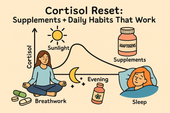
Cortisol Reset: Supplements + Daily Habits That Work
-
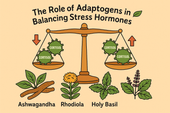
The Role of Adaptogens in Balancing Stress Hormones
Adaptogens work at the root of stress — your nervous system. 🌿 Learn how these powerful herbs help regulate cortisol, calm your nerves, and restore balance between energy and relaxation. ✨
-
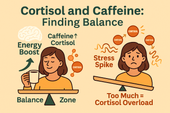
Cortisol and Caffeine: How Much Is Too Much?
Caffeine can boost energy and focus — but too much can overstimulate your stress hormones. ☕ Learn how caffeine affects cortisol, energy levels, and mood, and discover how to find the perfect balance for lasting calm and clarity. 🌿
-
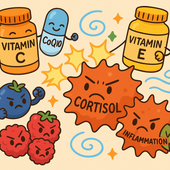
Antioxidants for Stress Management and Cortisol Control
When stress overwhelms your body, antioxidants come to the rescue. 🌿 Learn how vitamin C, CoQ10, and other natural compounds help reduce oxidative stress, regulate cortisol, and restore calm energy from within. ✨
-

Vitamin D and Cortisol: Supporting Immune Balance
Vitamin D does more than strengthen bones — it helps regulate cortisol and support immune balance. 🌞 Learn how this essential hormone-like nutrient restores calm, improves mood, and strengthens your body’s natural stress defenses. 🌿
-
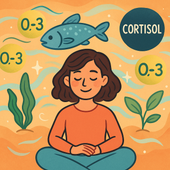
Omega-3s and Cortisol: Fighting Inflammation Naturally
Omega-3s are more than heart-healthy fats — they’re natural cortisol regulators. 🌿 Learn how EPA and DHA help reduce chronic inflammation, calm the nervous system, and support stress recovery from the inside out. ✨
-
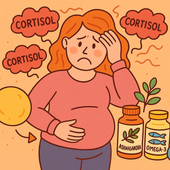
High Cortisol and Belly Fat: Can Supplements Help?
Chronic stress can make belly fat harder to lose — but supplements like ashwagandha, magnesium, and omega-3s may help restore cortisol balance. 🌿 Learn how science-backed nutrients support fat metabolism, calm your stress response, and bring your body back into harmony. ✨
-
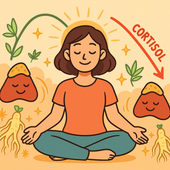
How Ginseng Can Support Energy and Cortisol Balance
Ginseng is one of nature’s most powerful adaptogens, helping your body handle stress without burning out. 🌿 Learn how this ancient root supports balanced cortisol, steady energy, and sharper focus — restoring vitality naturally and sustainably. ✨
-
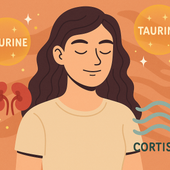
Taurine and Cortisol: Supporting Focus Under Stress
When cortisol surges, focus fades — but taurine helps restore balance. 🌿 Learn how this powerful amino acid calms your nervous system, regulates stress hormones, and sharpens concentration without jitters or fatigue. ✨
-
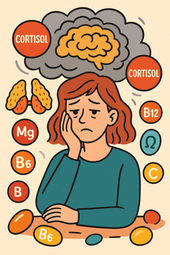
The Link Between Cortisol, Brain Fog, and Nutrient Deficiencies
When brain fog sets in, it’s not just in your head — it’s in your hormones. 🌿 Discover how cortisol imbalance and nutrient deficiencies like low magnesium, B vitamins, and omega-3s can cloud your focus and how restoring balance brings back mental clarity and calm. ✨
-
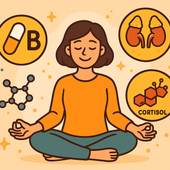
B Vitamins for Stress, Energy, and Cortisol Regulation
B vitamins are the foundation of stress resilience and steady energy. 🌿 Learn how this essential group of nutrients helps regulate cortisol, restore focus, and keep your nervous system calm — giving you balance from the inside out. ✨
-

Cortisol Imbalance and Chronic Fatigue: Can Supplements Help?
When chronic stress keeps cortisol high, fatigue and brain fog follow. 🌿 Learn how to rebalance your stress hormones naturally with calming nutrients, adaptogens, and lifestyle rituals that restore energy, focus, and inner peace. ✨
-

Adaptogen Stacks for Better Sleep and Lower Stress Hormones
Adaptogens can help your body recover from stress and sleep better by regulating key hormones like cortisol and adrenaline. 🌿 Learn how adaptogen stacks work to restore balance, calm the mind, and rebuild resilience — so you can rest deeply and wake renewed. ✨
-

Phosphatidylserine for Nighttime Cortisol Control
When stress hormones stay high at night, deep rest becomes impossible. 🌙 Discover how phosphatidylserine helps calm the brain, reduce nighttime cortisol, and restore healthy sleep rhythms — so you can wake up peaceful, clear, and recharged. ✨
-

Magnesium for Stress Relief and Cortisol Reduction
Magnesium is one of the most powerful natural tools for stress relief. 🌿 This essential mineral calms your nervous system, lowers cortisol, and helps your body recover from chronic tension. Learn how magnesium replenishes balance, improves sleep, and restores inner peace — naturally. ✨
-

Supplements to Improve Sleep by Balancing Cortisol
When cortisol stays high at night, sleep becomes a struggle. 🌙 Discover natural supplements that calm the nervous system, lower stress hormones, and restore your body’s natural rhythm. From magnesium and ashwagandha to L-theanine and phosphatidylserine, learn how to build deeper, more restorative rest. 🌿
-

Cortisol and Sleep: Why Stress Keeps You Awake
When stress keeps your body in fight-or-flight mode, cortisol refuses to calm down — and sleep becomes impossible. 🌙 Learn how elevated cortisol disrupts your circadian rhythm, suppresses melatonin, and turns restless nights into exhaustion. Discover how to restore balance and reclaim deep rest. ✨
-

L-Theanine for Cortisol Balance and Anxiety Relief
L-Theanine — the calming amino acid from green tea — helps quiet the mind and balance cortisol, the body’s key stress hormone. 🌿 Learn how it promotes calm focus, eases anxiety, and supports deep rest without sedation, backed by modern research and centuries of tradition. ✨
-

Rhodiola Rosea and Stress Resilience: A Natural Cortisol Regulator
Rhodiola rosea is one of nature’s most powerful tools for resilience. 🌿 This Arctic root helps balance cortisol, fight fatigue, and sharpen focus — keeping you calm yet energized even under stress. Discover the science behind Rhodiola’s adaptogenic power and how it helps your body thrive under pressure. ✨
-

Ashwagandha for Cortisol Balance: What the Science Says
Ashwagandha helps your body recover from chronic stress by calming the adrenal system and balancing cortisol — your key stress hormone. 🌿 Learn what science says about this powerful adaptogen, how it restores energy and focus, and why it’s one of nature’s most effective tools for modern stress relief. ✨
-

Supplements That Naturally Lower Cortisol Levels
When cortisol levels calm, your energy transforms — no more crashes or jitters, just steady focus and inner peace. 🌿 Learn which natural supplements and habits lower stress hormones, boost calm energy, and help your body thrive with balance instead of burnout. ✨
-

What Is Cortisol Imbalance? Symptoms You Shouldn’t Ignore
Cortisol — your body’s main stress hormone — keeps you alert and energized, but when it’s out of balance, it can drain your health. 🌿 Learn the signs of cortisol imbalance, from fatigue and anxiety to sleep disruption and stubborn weight gain, and discover how to restore calm, energy, and hormonal harmony naturally. ✨
-

The Best Daily Multivitamins for Menopausal Women
Menopause brings new nutritional needs that your old vitamin routine may no longer meet. 🌿 Discover how the right daily multivitamin can boost energy, balance mood, support bone and heart health, and keep your skin glowing. Learn which nutrients truly matter — from vitamin D to magnesium and B12 — to feel strong and vibrant every day. ✨
-

Antioxidants and Menopause: Fighting Inflammation Naturally
During menopause, oxidative stress and inflammation can quietly accelerate aging, fatigue, and skin changes. 🌿 Learn how antioxidants — from vitamins C and E to polyphenols in berries and green tea — help neutralize free radicals, reduce inflammation, and restore balance naturally. Discover the science of radiant, resilient aging. ✨
-

How CoQ10 Supports Heart Health After Menopause
After menopause, heart health becomes more important than ever. ❤️ Discover how CoQ10 — your body’s natural energy molecule — supports cardiovascular strength, restores vitality, and protects against oxidative stress. Learn how this essential nutrient helps keep your heart energized, balanced, and resilient through every stage of life. 🌿
-

Collagen Supplements for Skin and Joint Health Post-Menopause
After menopause, collagen loss affects both skin elasticity and joint comfort — but supplements can help rebuild from within. 🌸 Learn how collagen peptides, vitamin C, and other nutrients work together to restore firmness, reduce stiffness, and keep you glowing and mobile well into your next chapter. ✨
-

Calcium and Vitamin D: Protecting Bone Health in Menopause
Menopause brings hormonal changes that can weaken bones—but with the right nutrients, strength and stability can be rebuilt. 🦴 Learn how calcium and vitamin D work together to protect bone density, prevent fractures, and keep your body resilient. This guide explores nutrition, sunlight, and lifestyle habits that help your bones stay strong and vibrant for years to come. ☀️💪
-

Adaptogens for Energy and Resilience During Menopause
Feeling drained or emotionally scattered during menopause? 🌿 Discover how adaptogenic herbs like Ashwagandha, Rhodiola, and Ginseng can restore energy, balance cortisol, and build emotional resilience. Learn how these natural allies work with your body—not against it—to help you stay strong, focused, and calm through life’s hormonal changes. 🌸
-

Supplements That Help Beat Menopause Fatigue
Menopause fatigue can feel like more than tiredness—it’s a total energy crash. This guide explores how specific supplements, mindful breathwork, and therapy can help restore balance. Learn how nutrients like B vitamins, magnesium, and adaptogens rebuild your stamina, while breathwork and emotional healing calm your nervous system and bring vitality back to your days. 🌿✨
-

Herbal Blends for Menopausal Restlessness: Finding Calm in Transition
Herbal blends bring the wisdom of nature into moments of rest and renewal. Discover how soothing herbs like chamomile, lemon balm, and ashwagandha work together to calm menopausal restlessness, balance hormones, and invite deep relaxation. 🌿💫
-

Magnesium + Glycine for Deep Sleep During Menopause
Nutrients like magnesium, glycine, and B vitamins form the foundation for deep, restorative sleep during menopause. Discover how these natural compounds calm your nervous system, balance hormones, and help you wake up refreshed and recharged. 🌿💤
-

Melatonin and Menopause: Restoring Your Sleep Cycle
Nutrients are the foundation of hormone balance and energy. Learn how vitamins, minerals, and whole foods like greens, salmon, and berries nourish women’s bodies during menopause and beyond — restoring vitality, mood, and strength. 🌿🥗
-

How L-Theanine Helps With Menopausal Anxiety
Science continually deepens our understanding of the human body, from hormones to neurotransmitters. Discover how evidence-based research shapes modern wellness — bridging natural medicine, neuroscience, and hormone balance for healthier living. 🔬🌿
-

Can Ginkgo Biloba Improve Memory in Menopausal Women?
Hormone therapy can be a powerful tool for easing menopause symptoms and restoring balance. Learn how it works, the types available, and how to combine it safely with lifestyle and natural support for optimal well-being. 🌸💊
-

B Vitamins for Mental Clarity During Menopause
Nutrients are the foundation of mental and physical balance during menopause. Discover how vitamins, minerals, and whole foods like leafy greens, fish, nuts, and citrus can fuel energy, clarity, and calm while supporting hormonal health. 🌿✨
-

Mood Swings and Menopause: Natural Nutrient Support
Probiotics do more than support digestion — they help balance mood, hormones, and immunity too. Learn how a healthy gut microbiome can ease menopause symptoms, boost energy, and improve emotional resilience naturally. 🌿🦠
-

Brain Fog in Menopause: Supplements That May Help
Supplements can be powerful allies in restoring balance, energy, and focus—especially during menopause. Learn how nutrients like omega-3s, vitamin D, magnesium, and herbal adaptogens work together to support brain health, reduce stress, and promote lasting vitality. 🌿💊
-

Adaptogen Stacks for Reducing Night Sweats
Hormone detox isn’t about cleansing your body—it’s about restoring flow. Learn how the liver, gut, and endocrine systems work together to eliminate hormone buildup and how herbs like milk thistle, dandelion, and schisandra support balance, clarity, and natural vitality. 🌿💫
-

Cooling Menopause Symptoms with Herbal Support
Ashwagandha is one of nature’s most powerful adaptogens, helping women manage stress, sleep better, and balance hormones naturally. Discover how this ancient root supports calm energy, emotional resilience, and relief from menopause-related anxiety and fatigue. 🌿💫
-

Evening Primrose Oil and Menopause: What the Research Says
Hot flashes are one of the most common—and frustrating—symptoms of menopause. Discover what causes them, why the body’s “internal thermostat” becomes unbalanced, and the natural supplements and lifestyle shifts that can help you cool down, rest better, and feel more in control. 🔥💧
-

How Black Cohosh Helps with Menopausal Symptoms
Sleep disturbances are among the most exhausting symptoms of menopause—but they don’t have to rule your nights. Discover how natural strategies and calming supplements can help you fall asleep faster, stay asleep longer, and wake up feeling truly restored. 🌙💤
-

Natural Supplements That May Reduce Hot Flashes
Hot flashes can disrupt sleep, confidence, and daily comfort—but natural relief is possible. Discover the best research-backed supplements like black cohosh, red clover, and licorice root that may reduce hot flashes, balance hormones, and restore inner calm during menopause. 🌿💫
-

Omega-3s and Menopause: Supporting Mood and Inflammation
Omega-3 fatty acids are essential for hormonal harmony, brain function, and emotional balance—especially during menopause. Learn how these healthy fats reduce inflammation, support heart health, and restore calm, vitality, and focus through every stage of midlife. 🌊💫
-

The Role of Vitamin D in Menopausal Health
Vitamin D plays a powerful role in menopausal health—supporting bone strength, hormone balance, and mood stability. Discover how optimizing your vitamin D levels can improve sleep, energy, and emotional well-being while protecting long-term vitality through every stage of menopause. 🌞💪
-

Magnesium for Menopause: Relaxation, Sleep, and Hormonal Support
Self-regulation is the art of staying calm, centered, and in control—no matter what life throws your way. Learn how to strengthen emotional balance, manage stress responses, and cultivate inner peace through mindful techniques that reconnect your heart, body, and brain. 🌿💫
-

Can Adaptogens Like Ashwagandha Ease Menopausal Symptoms?
Brain fog during menopause can make even simple tasks feel overwhelming—but you’re not losing your sharpness, your hormones are simply shifting. Discover how adaptogens like ashwagandha and key nutrients can restore mental clarity, balance cortisol, and bring calm focus back to your day. 🌿🧠
-

Supplements That Support Hormonal Balance During Menopause
Herbal supplements have supported women’s health for centuries—and modern science is finally catching up. From ashwagandha and maca to red clover and rhodiola, discover how nature’s most trusted herbs can calm stress, balance hormones, and enhance energy through every life stage. 🌿✨
-

The Ultimate Motivation Stack: Supplements That Work Together
Discover how therapy helps restore motivation, focus, and emotional balance alongside supplement and mindset strategies. This empowering article explores how addressing thought patterns and emotional blocks through therapy can complement biochemical tools for long-term drive and well-being. 🧠💬
-

Entrepreneurial Drive: Can Supplements Help You Avoid Burnout?
Entrepreneurship demands energy, creativity, and mental resilience—but without balance, it leads to burnout. This in-depth article explores how nootropic supplements, adaptogens, and mindset tools can help entrepreneurs sustain motivation, manage stress, and keep their drive sharp for the long haul. 🚀💼

















































